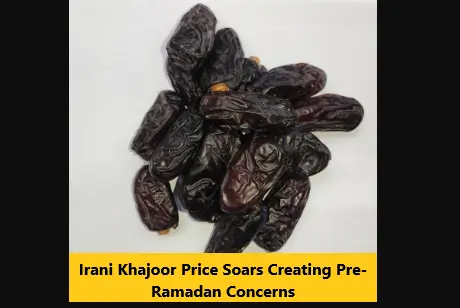Irani Khajoor Price Soars Creating Pre-Ramadan Concerns.
Irani Khajoor Prices Soar: Pre-Ramadan Concerns for Pakistani Consumers
As the holy month of Ramadan approaches, Pakistani consumers face a significant challenge: a steep rise in the price of Irani Khajoor (Iranian dates), a staple food item during Ramadan.
Read More: Moon Sighting Predicted for March 10th: Ramadan 2024
This sudden surge has sparked concerns and anxieties among both consumers and traders.
Price Hike and Market Dynamics:
Recent days have witnessed a dramatic price increase in the wholesale market for Irani Khajoor. Dates have seen a whopping 4,000 rupees per maund (approximately 37.32 kilograms) increase, jumping from 12,000 rupees to 16,000 rupees.
Reasons Behind the Surge:
Several factors are attributed to this price hike, including:
- Shortage of Dates in the Market: A limited supply of dates is currently circulating, creating an imbalance in demand and supply.
- Storage Challenges: The availability of dates is further restricted due to challenges with storage. Traders, anticipating the surge in demand during Ramadan (falling between 15th Sha’ban and 15th Ramadan this year), have reportedly stocked up on dates in cold storage, leaving less readily available for immediate purchase.
- Hoarding Concerns: While no official reports or actions have been taken against potential hoarding of date stocks, concerns linger among consumers about this practice further contributing to the price rise.
Potential Impact and Predictions:
This sudden price increase is likely to have a significant impact on consumers, especially those who rely heavily on Irani Khajoor for Iftar and Suhoor meals during Ramadan. Experts warn that prices could potentially reach a staggering 20,000 rupees per maund if the current trend persists.
Alternatives and Looking Ahead:
While the situation presents challenges, consumers can explore alternative options such as:
- Dates from other regions: Exploring dates from other regions, like Pakistani dates, might offer a more affordable solution.
- Substitute fruits: Fruits like bananas, mangoes, and apricots can be incorporated into Ramadan meals as a source of essential nutrients.
- Collective action: Consumers can consider forming bulk-buying groups to potentially negotiate better prices with wholesalers.
It is crucial to stay informed about the market situation and explore alternative options to manage the impact of this price increase. As Ramadan approaches, consumers can adapt their shopping strategies and potentially seek substitutes to ensure access to essential food items during this holy month.
Note: The information above might not be accepted 100%. Please verify from your own sources. We will not be responsible for any kind of loss due to our content.
For more news, please visit Munafa Marketing.




